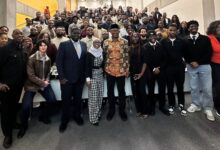
“What lies beyond the pomp and circumstance of graduation day, when the cheers and congratulations fade, and the harsh reality of a competitive job market stares you squarely in the face?”
The reality is that the media industry is rapidly changing, and the traditional paths to success are no longer guaranteed. The rise of digital media, the proliferation of social platforms, and the shifting landscape of traditional media outlets have created a complex and competitive environment that demands more than just a degree. It demands skills, adaptability, creativity, and a willingness to learn and evolve.
Amidst this uncertainty, there are stories of hope and resilience especially for mass communication graduates, who have refused to be defined by the limitations of their certificates – who have instead leveraged their skills, talent, and determination to build successful careers and create their own opportunities.
According to the publisher of New Americans Magazine in Ohio, United States of America (USA), Mr. Deba Uwadiae, the job market for Mass Communication graduates has become very competitive because media houses are contending with the new media technology which has changed from the traditional operations, particularly in print media to digital sphere.

“People no longer wait for scheduled news time to hear the news whether in print or electronics as it were. They get their notices on the devices for breaking news. Devices could be wristwatch, mobile phone, computer, laptop, iPad, hearing aid, and many other modern day devices that can be connected to the internet.
“People no longer look forward to scheduled news programs or evening or daily newspapers or even weekly or monthly or quarterly magazines to read or hear the news. All these developments have affected how the media houses generate revenue and create opportunities for Mass Communication graduates,” he said.
The veteran journalist, however, disclosed that in this era, a graduate that is digitally experienced is more likely to get a job than a graduate that is not digitally compliant – explaining that “that is why the Mass Communication Department must create and expose students to studies on social media impact on mass communication.”
He emphasised the significance of being exceptional as a mass communication graduates, noting that outlook is very important in standing out among peers, including how to dress, mannerism, knowledge of current affairs and confidence in interaction as well as integration with the public and environment they find themselves.
The fellow of the National Association of Political Correspondents stressed that all sectors require mass communication graduates in this age saying; “They all need content writers, creative individuals, social media content monitors, analysts and advisers, public relations officers, media consultants and media content monitors and managers.
“These are areas where mass communication graduates have potentials of excelling with other graduates from different fields.”
Mr. Uwadiae, who is also the supervisor at the New American Community Information Center in Columbus, Ohio, pointed out the misconceptions about the job prospects for mass communication graduates; “They will say ‘Journalism is an all comer affair and so you don’t have to be a mass communication graduate to get a journalism job.’
“But no media house wants to spend all day teaching a graduate how to write, source and deliver a story. They want people who are already trained in that field to come in and start work with little or no orientation.”
He advised campus journalists to start writing for media houses while in school in order to create successful strategies and career opportunities for themselves after graduation.
Recounting his time in school as a ‘testament’, he said: “I started writing opinion articles when I was in school. Some of those articles were what I showed to Vanguard Newspaper when I was in school that gave me a freelance job.
“As a student, I was already freelancing with the Vanguard Newspaper along with Dr. Jossy Nkwocha, who was my classmate then. He was the first to approach Vanguard Newspaper and asked me to go try my luck.
“And these days, Mass Communication undergraduates have the benefit of social media and different platforms to start applying what they are learning.”
The media practitioner also encouraged undergraduates to engage in school activities such as school press club, social club and other opportunities within the school system to show or prove what they can do.
His words: “Open accounts on social media platforms like LinkedIn to express your availability to work, post some of your works to your page, engage in productive subjects, research media organizations that use part time journalists locally and internationally, participate in voluntary activities that contribute to development and growth of the community, become an advocate for your community, clubs and groups. They help you build your profile and possibility of getting hired faster than others.”
He also explained that mass communication graduates can leverage their education and background to pursue non-traditional career paths or entrepreneurial ventures saying; “Every business requires publicity. The mass communication graduate is trained in that area. Mass Communication is a powerful tool for selling and promoting products. I started my first business, a barber shop with electric clippers in February 1990 at the age of 24 years while working as a journalist with the Republic Newspaper.
“I used my journalism training to market it and spread the news without spending money on advertising and it became very popular and successful. It operated for 17 years. I did many other things in Lagos in those days leveraging my background. I was into media consulting, public relations consulting, seminars, conferences, and sports promotion.”
He reiterated the significance of social media in the career trajectories of mass communication graduates, noting that “it is a free space for all. You do not even need to wait to graduate before making money on social media. Creativity is the keyword. Research areas that are not well considered or properly covered on social media. There are so many. Explore it.”
The Nigerian Institute of Journalism (NIJ) Alumnus also enjoined mass communication graduates to look beyond job hunting saying; “Create the job. My maxim that I have opposite me in my office is if they tell you “You don’t have a platform, create the PLATFORM. You don’t have the space, create the SPACE. You can’t have an impact, be the IMPACT. Be what they say you can’t be.”
Similarly, a lecturer at NIJ, Mr. Anthony Oligbo stressed that the current job market in mass communication is broad, due to the various genres of the profession and the flexibility it has to offer.

Mr. Oligbo explained that students of mass communication may face the challenge of getting their desired job, especially if they had narrowed their view/choice to the media industry from the onset.
“In other words, graduating students should have a focus, when that dream do not happen in the immediate, they should look out for other options that is still related to the course of study. With a broad minded approach, they will overcome the challenge of lack of employment,” he enthused.
The communication expert emphasised that employers are looking at problem solving skills, writing and speaking skills as well as administrative competence.
“They want to see your hard skills which are core skills needed for the job and soft skills like leadership, ability to communicate & cultivate a good rapport with staff and so on. It is said, that hard skills give you the job, while soft skills, get you promoted.
“Mass communication students can differentiate themselves by primarily paying attention to their course of study. Love all the courses they are offering. You may dislike the lecturer, but do not dislike his course, as the knowledge of that course may put food on the table in the future.
“Again, have an active school life, relate with fellow students, join clubs, don’t be a lone ranger. Coming to school is beyond academics alone. Engage in workshops, seminars, trainings, attend them intentionally,” Mr. Oligbo stated.
He urged undergraduates and mass communication graduates to embrace the opportunities available in the media and journalism space.
The lecturer said: “The broadcast industry is there, social media is a broad one, print medium, the film industry, as well as the PR and advertising industry, others include the religious spheres, public speaking and training spheres. The course is multidimensional, depending on the direction you are looking at.”
Mr. Oligbo highlighted the myths about the job prospects for the mass communication graduates, maintaining that not everyone will end up as journalists. He, however, revealed that ingenuity can overcome the myths.
“Take your creativity along with you and you will succeed,” the media expert added.
He charged mass communication graduates to be voracious readers in pursuit of career opportunities beyond their degrees.
“Be eager to know everything. Research skills is germane, develop your Unique Selling Proposition (USP) early in the career. Be hard working, be humble, get and sustain a relationship with a mentor.”
He equally charged them to take advantage of student membership of professional institutes such as Nigerian Institute of Public Relations (NIPR), Advertising Practitioners Council of Nigeria (APCON) – as well as clubs and online communities with local and international affiliations.
Oligbo elucidated: “It’s always good to get an entrepreneurial skill while studying. This skill may end up becoming your mainstay, or serve as a good startup in life. The knowledge in Mass Communication will serve in any entrepreneurial venture and such entrepreneurial venture could be fashion designing, photography, cinematography, bead making, cobbling, graphics design and printing and so on.”
He described the digital space as a game changer that mass communication graduates can leverage on to explore career advancements, stressing that it needs to be maximised with the knowledge of Artificial Intelligence (AI), data journalism and product management.
The communicator also highlighted ‘spoken word artists’, which is involved in specialised reporting such as the environment, health and other developmental areas.
He assured undergraduates and mass communication graduates alike that success is easier to achieve in the market place with good grades and hands-on practical experience.
“Get good grades. No fun in school should jeopardize your getting good grades. The words of Abraham Lincoln comes handy here, he opened, ‘Get the qualification and wait for the opportunity. Also, upon graduation, graduates should be broad-minded, they could begin their career in an area where they may not really like initially, but gradually they will navigate to the area they most desire.”
This, he said, they need to understand as well as the significance of experience, adding that “you must be a marketable graduate with both soft and hard skills.”







